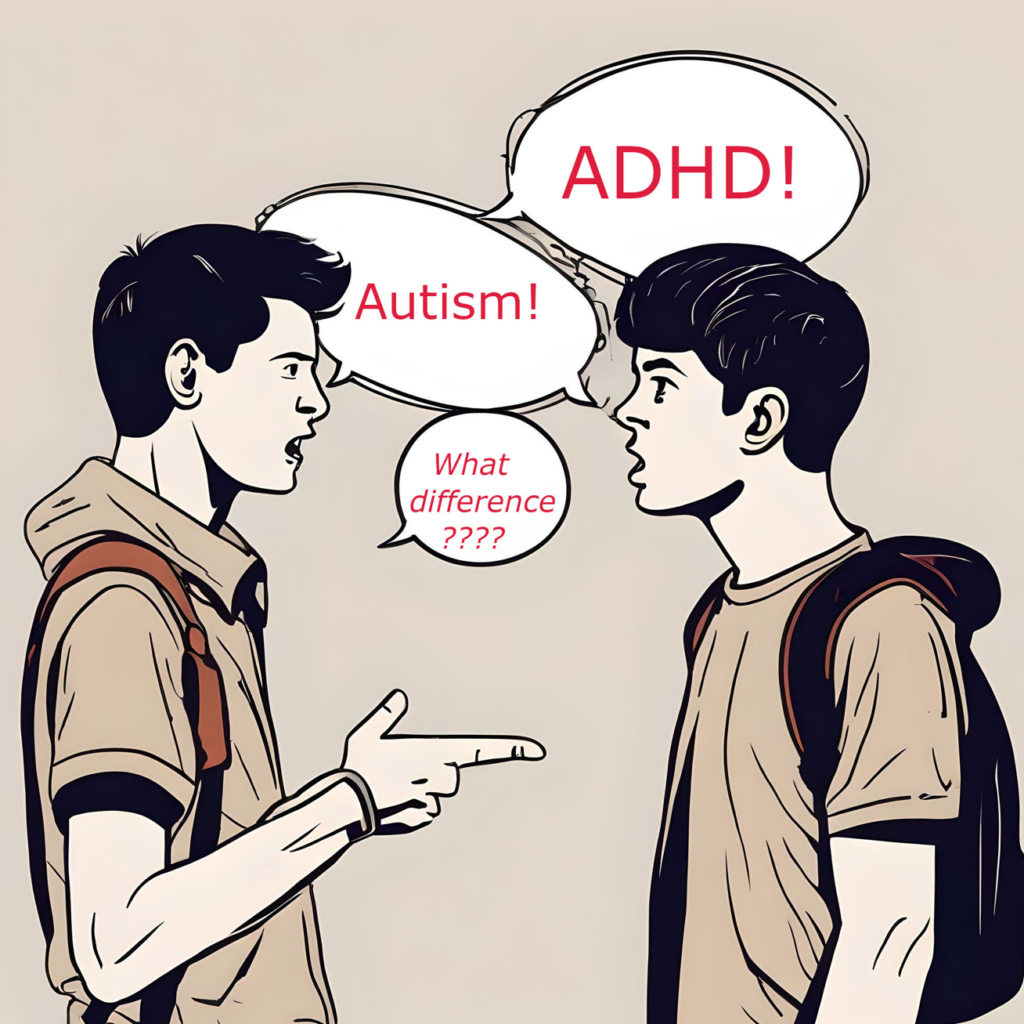In the realm of neurodevelopmental diversity, the distinction between ADHD and Autism often gets blurred in the eyes of the uninformed. As someone deeply entrenched in the world of Autism, it’s a nuanced journey to unravel the unique traits that set these conditions apart. Come on and explore the unique traits of ADHD and Autism
In today’s society, it’s common for people to equate ADHD and Autism when discussing neurodevelopmental disorders. For someone like me, with a deeper understanding of Autism, this tendency can become somewhat provoking, albeit stemming from a lack of awareness.

ADHD (Attention-Deficit/Hyperactivity Disorder) and Autism (Autism Spectrum Disorder) are two distinct neurodevelopmental disorders affecting behavior, cognition, and social interactions. Despite some shared characteristics, it’s crucial to recognize them as separate conditions with unique diagnostic criteria and characteristics. Here are ten concrete examples highlighting the unique traits of ADHD and autism:
- Core Symptoms: ADHD’s primary symptoms include inattention, hyperactivity, and impulsivity. Autism’s core symptoms involve challenges in social interaction, restricted interests, and repetitive behaviors.
- Social Interaction: Individuals with ADHD may struggle to maintain focus in social situations, displaying impulsivity. Those with Autism may find it challenging to understand non-verbal communication, possess limited social skills, and may resist eye contact or physical touch.
- Communication: People with ADHD may struggle with listening or sustaining a conversation, occasionally interrupting or talking excessively. Those with Autism may face difficulties understanding and using language, interpreting communication nuances, and may use literal speech.
- Limited Interests and Repetitive Behaviors: While individuals with ADHD may have fleeting interests and quickly shift focus, those with Autism tend to develop intense and limited interests in specific subjects or objects. They may also engage in repetitive behaviors, such as hand movements or fixation on specific items. Read my article about Special interests.
- Sensory Sensitivity: Individuals with Autism may be oversensitive to sensory stimuli like noise, light, or touch, reacting negatively to certain stimuli. This is less common in individuals with ADHD.
- Hyperactivity: Hyperactivity is prevalent in ADHD, whereas individuals with Autism may exhibit a more varied energy level, ranging from hyperactivity to hypoactivity.
- Problem Solving: Those with ADHD may struggle with organizing and planning activities, displaying impulsive decision-making. Individuals with Autism may face challenges in flexibility and abstract thinking, affecting their problem-solving abilities.
- Mutual Relationships: Individuals with ADHD may experience difficulties in building and maintaining mutual relationships due to impulsive and distracted behaviors. Those with Autism may also face challenges in social relationships, often related to difficulties in social interaction and empathy.
- Developmental Course: ADHD is often diagnosed in childhood, with symptoms possibly persisting into adulthood. Autism can be diagnosed early in childhood or discovered later in life, with varied expressions over time.
- Treatment: ADHD treatment often involves medication and behavioral therapy to manage symptoms. Autism treatment includes behavioral therapy, special education, and support for developing social skills and reducing restricted behaviors. It’s essential to note potential overlaps, and a professional evaluation is crucial for accurate diagnosis and a personalized treatment plan.
How about medication?

Medication is commonly used as a treatment method for ADHD (Attention-Deficit/Hyperactivity Disorder) to manage symptoms and improve functioning. On the other hand, there is no specific medication to cure Autism (Autism Spectrum Disorder), and medication is not typically the primary treatment for autism. Several reasons contribute to the use of medication for ADHD but not for autism:
Research Basis: There is extensive research supporting the use of medication to treat ADHD. Medications like central stimulants (such as methylphenidate or amphetamine-based drugs) can help improve attention, impulsivity, and hyperactivity in individuals with ADHD. In contrast, research on the effectiveness of medication for autism is more limited, with no specific medication proven effective for addressing core autism symptoms.
Basic differences
ADHD and autism have different core symptoms and challenges. ADHD involves difficulties with attention, impulsivity, and hyperactivity, and these symptoms can be improved with medication that enhances concentration and reduces hyperactivity. Autism involves challenges with social interaction, communication, and repetitive behaviors, which are more complex and not directly impacted by medication. Symptoms and needs vary among individuals with autism. What may be challenging for one person with autism may differ for another. Hence, finding a universal medication to address the specific and varying difficulties of individuals with autism is challenging.
The treatment strategy for autism typically focuses on behavioral therapy and interventions aimed at improving communication, social skills, independence, and managing restricted behaviors. These approaches focus on teaching skills and adapting the environment to support individuals with autism, rather than relying on medication to manage symptoms. It’s crucial to note that while there is no specific medication for autism, certain medications may be used to address specific symptoms or comorbidities, such as anxiety, sleep difficulties, or aggression. However, medication should only be used after careful evaluation and guidance from a physician or a specialist in the field.
Conclusion
In the vast spectrum of neurodiversity, recognizing and respecting the individuality of the unique traits of ADHD and autism is paramount. By delving into the specifics, we pave the way for a more inclusive understanding, fostering acceptance and support for every neurodivergent path.
Are you also provoked when someone equates ADHD and Autism? The difference is significant, even though it may seem subtle at first glance. Many individuals have both diagnoses, perhaps contributing to the confusion. Please share your thoughts and experiences on the distinctions and encounters with ignorance in the comments. If you like my work, please support me and my site and buy me a coffee.



Leave a Reply